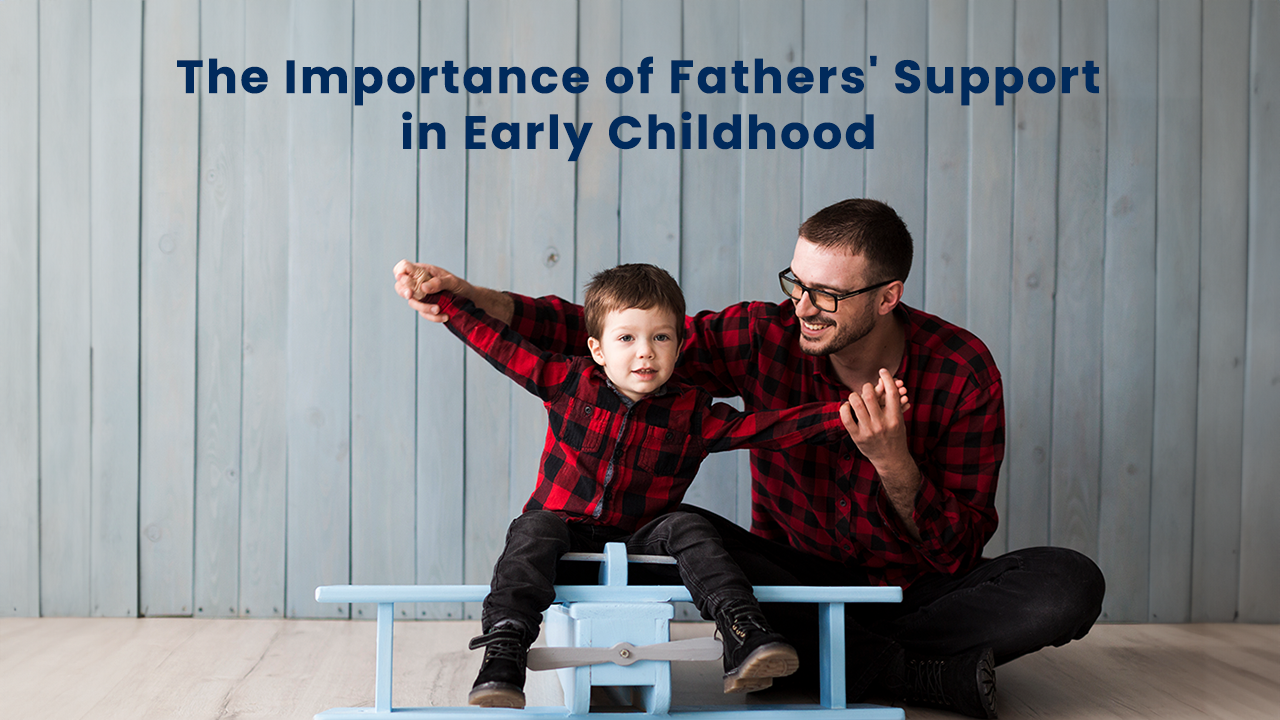
When it comes to a child’s upbringing, the role of both parents is invaluable. While the significance of a mother’s love and care cannot be overstated, it is equally essential to recognize and appreciate the Importance of fathers’ support in early childhood. Research consistently shows that father support during these formative years profoundly impacts a child’s emotional, social, and cognitive growth. In this blog, we will delve into how fathers contribute to their children’s development, highlight the importance of their involvement, and discuss the role of daycare centers in strengthening the relationship between fathers and their children.
The Importance of Fathers’ Support in Early Childhood:
List of Benefits That Come with Fathers’ Support In Early Childhood
1- Nurturing Emotional Bonds:
Fathers have a unique way of interacting with their children, fostering emotional security and self-confidence. Their engagement in activities such as playing, cuddling, and comforting helps establish a strong bond, enabling children to develop a sense of trust and emotional stability. When fathers actively participate in caregiving tasks, they signal to their children that they are loved, valued, and supported, contributing to their overall emotional well-being.
2- Positive Role Modeling:
Children learn through observation, and fathers serve as important role models for their sons and daughters. Fathers who display positive behaviors, such as kindness, respect, and empathy, teach their children valuable life lessons and help shape their moral compass. By witnessing their fathers’ involvement in household chores, nurturing relationships, and pursuing personal goals, children develop a broader understanding of gender equality and are more likely to adopt healthy behaviors and attitudes.
3- Enhancing Cognitive Development:
Father involvement has been linked to improved cognitive abilities in children. Fathers often engage in activities stimulating their child’s intellectual curiosity, such as reading, problem-solving, and imaginative play. Their active participation in these activities supports the development of language skills, critical thinking, and problem-solving abilities. Research suggests that children with involved fathers tend to perform better academically, exhibit higher levels of curiosity, and demonstrate greater intellectual competence.
4- Fostering Social Skills:
The presence of a father figure in a child’s life can significantly impact their social development. Fathers encourage exploration, risk-taking, and independence, promoting the development of essential social skills. They provide a unique perspective and offer different interactions, broadening a child’s social experiences. Through shared activities, fathers can teach their children crucial social values, such as cooperation, teamwork, and effective communication, which are crucial for healthy relationships later in life.
5- Boosting Self-Esteem:
A father’s support and encouragement can impact a child’s self-esteem and self-worth. Fathers who provide praise, validation, and constructive feedback help build their children’s confidence and resilience. When fathers actively engage in their child’s life, express interest in their achievements, and offer guidance during challenging times, children develop a strong sense of self-belief and feel more secure in exploring their own abilities and pursuing their goals.
The Role of Daycare Centers in Strengthening Relationships Between Fathers and Their Children
The importance of fathers’ support in early childhood is paramount. Daycare centres have become integral to many families’ lives in today’s fast-paced world. While their primary function is to provide quality care and early education for children, daycares also play a crucial role in strengthening the relationships between fathers and their children.
In this section, we will explore ways in which daycares contribute to fostering meaningful connections between fathers and their children.
1- Encouraging Active Participation:
Daycare centers offer a unique opportunity for fathers to actively engage in their children’s daily routines and activities. By dropping off or picking up their children, fathers can establish a regular presence within the daycare setting. This involvement allows them to witness firsthand their child’s growth, development, and interactions with peers and educators. Regular participation creates a strong foundation for building a bond and staying connected with their child’s experiences, fostering a sense of shared involvement and commitment.
2- Promoting Parent-Teacher Collaboration:
Daycare centres provide a platform for fathers to collaborate with educators and participate in their child’s learning journey. Fathers can stay informed about their child’s progress, developmental milestones, and activities through regular communication channels. These activities could be parent-teacher meetings, newsletters, or online platforms. These interactions create opportunities for fathers to discuss their child’s interests, strengths, and areas for growth with educators. This fosters a deeper understanding of their child’s unique needs and enhances their involvement in their child’s education.
3- Engaging in Special Events and Activities:
Daycare centers often organize special events, celebrations, and activities that encourage parental participation. These occasions serve as important opportunities for fathers to engage with their children in a shared environment actively. Attending a family day or joining the classroom, fathers can actively contribute to their child’s learning experiences and create lasting memories together. These shared moments strengthen the bond between fathers and their children, building a sense of belonging and reinforcing their relationship.
4- Facilitating Play Activities between Parents and Children:
Daycare centers can play a crucial role in organizing and facilitating play activities involving parents and children. These activities provide a structured and supportive environment for fathers to participate in playtime with their children actively. By organizing parent-child play sessions, such as family playdates, parent-child workshops, or interactive playgroups, daycares create opportunities for fathers to bond with their children through play. These activities promote joyful interactions and foster the development of essential skills, such as communication, problem-solving, and socialization, for both fathers and children. Explore More Indoor and Outdoor Play Ideas for Children in Daycare from here
5- Providing Parenting Support and Resources:
Many daycare centers offer parenting workshops, seminars, or support groups, creating a supportive network for fathers. These resources provide valuable information, guidance, and strategies for fathers to navigate the challenges and joys of parenthood. By equipping fathers with knowledge and tools, daycare centers empower them to become more confident and involved parents. When fathers feel supported and have access to resources, they are better equipped to build strong relationships with their children.
6- Recognizing and Celebrating Fatherhood:
Daycare centers play a crucial role in acknowledging the Importance of fathers’ support in early childhood. By involving fathers in various aspects of their child’s daycare experience, such as organizing father-child bonding activities, daycare centres reinforce the value of fathers’ presence and contributions. This recognition helps foster a sense of pride and commitment in fathers, motivating them to continue nurturing their relationship with their children.


